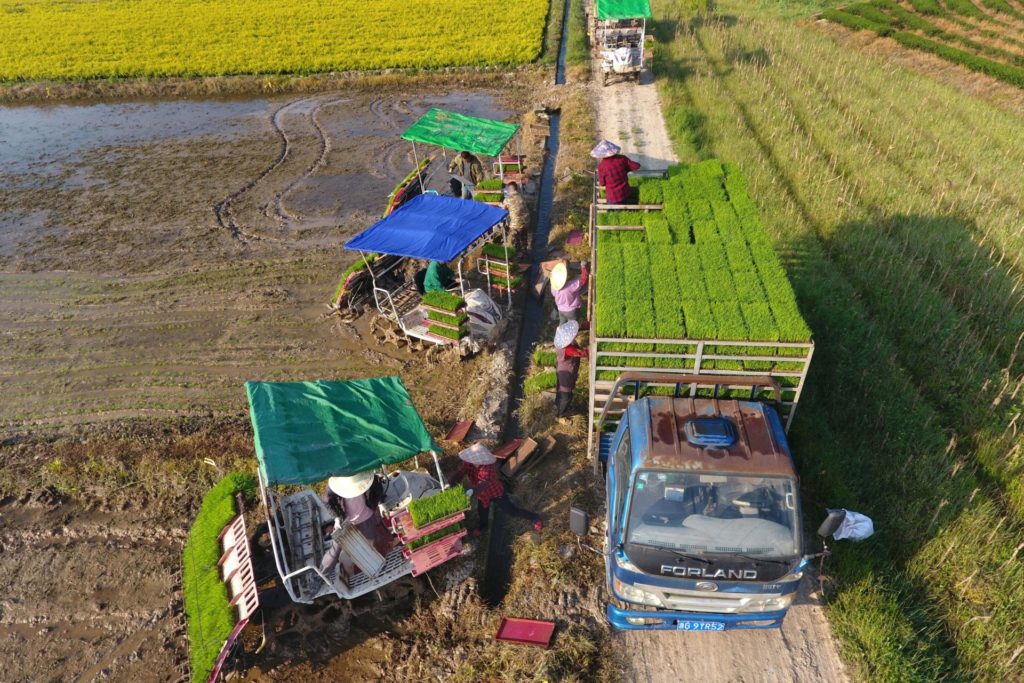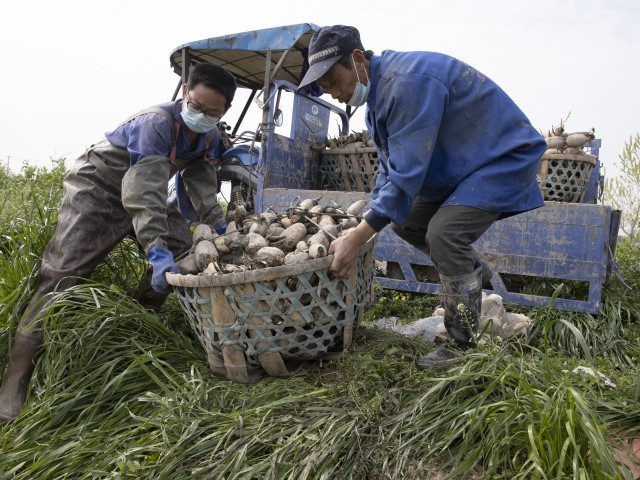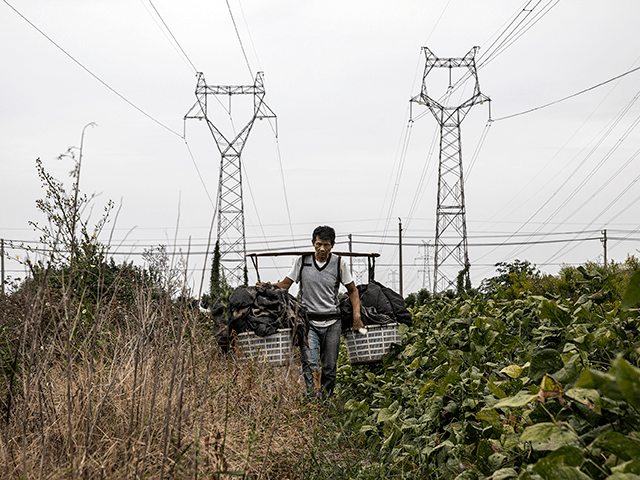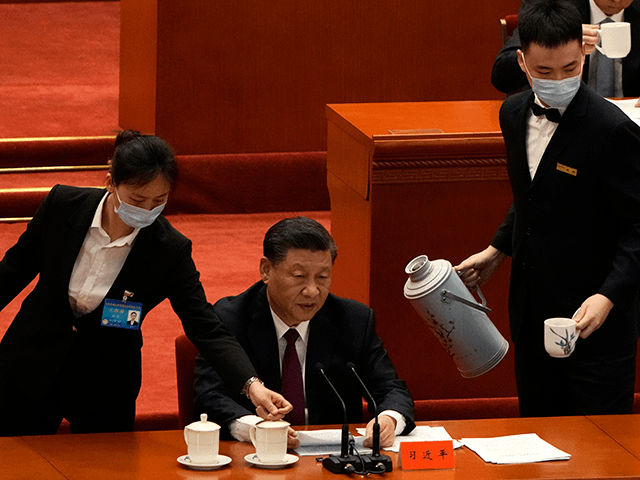Chinese dictator Xi Jinping addressed looming fears of a food crisis Sunday during a trip to the southern island of Hainan.
Xi was noticeably less dismissive of China’s lockdown-exacerbated agricultural problems than Chinese state media has been, but expressed confidence that China’s science and industry could surmount all hurdles to achieve his goal of “self-supporting” food security.
While state media spent the past week insisting China has no serious food supply problems, dismissing all evidence to the contrary as a sinister conspiracy by foreign media to demoralize workers with a fake crisis narrative, Xi seemed willing to acknowledge problems lay ahead. He said China could solve them by reducing its need for imports, in particular by improving its seed industry.
“Only by holding Chinese seeds tightly with our own hands can we stabilize the Chinese rice bowl and achieve food security,” Xi said while visiting the Yazhou Bay Seed Laboratory in Hainan.
“To ensure that China’s seed resources are self-supporting and under better control, self-reliance must be achieved in seed technology,” he declared.
China’s state-run Global Times dutifully noted that shares of seed production companies “roared” by nine percent when the stock markets opened on Monday, while the Shanghai Composite Index was down 2.61 percent overall.

Farmers seed rice in a field in Wuyi, in China’s eastern Zhejiang province on April 12, 2022. (STR/AFP via Getty Images)
China’s seed industry “has made great progress but still lags international standards by a big margin,” a senior Chinese official admitted to the South China Morning Post (SCMP) on Monday
Chinese scientists are especially envious of the U.S. genetic “dictionary,” a painstakingly compiled and carefully protected database that helps American companies breed superior crops.

In this April 6, 2020, photo, Jiang Yuewu, right, prepares to replant his crop of aquatic tubers known as lotus roots in the Huangpi district of Wuhan in central China’s Hubei province. (AP Photo/Ng Han Guan)
Hainan’s laboratories play a key role in China’s effort to catch up. The tropical island boasts little farmland, but the soil is incredibly rich, so it hosts several major laboratories for agricultural research, plus an oceanographic institute. The SCMP noted that China’s Belt and Road infrastructure program has given the Chinese opportunities to bring seeds from many different countries to Hainan’s labs for experimentation.

A man is seen carrying farm tools as he walks past an electric tower on October 13, 2021 in Hanchuan, Hubei province, China. (Getty Images)
The Global Times continued to insist China has no real food supply problems, ignoring the lockdown-created problems cited by many farmers to boast that since “95 percent of staple food grains reaped in the country such as rice and barley are cultivated using self-developed seeds,” China has no reason to worry about global market disruptions caused by the Russian attack on Ukraine.
In a rare note of caution that deviated from the Chinese state media narrative of blithe unconcern with Russia and Ukraine, one executive from a Chinese biotech startup told the Global Times the war was seen as a “wake-up call to China’s agricultural security.”
Domestically developed seeds, a crucial part of China’s food security, have gained the attention of the top leadership, as security of agricultural “chips” is shown to be topping the government agenda along with various other aspects of economic security. https://t.co/0Yqotlssbg
— Global Times (@globaltimesnews) April 11, 2022
The Global Times gushed about all the “miraculous” seed research being conducted in Hainan, which attracts thousands of scientists and farm workers from other provinces every fall and spring. Over 600 agricultural companies have operations in Hainan, including some foreign firms.
According to the Global Times report, these companies have been able to develop improved seeds for corn, rice, and soybeans, the latter being China’s major imported crop. China got lucky in March and received more soybeans from abroad than expected, with world markets tight and top exporter Brazil reporting delayed harvests.
Even with the improved seeds, China still has trouble growing enough soybeans. One of the Chinese agricultural corporations that spoke to the Global Times said it was planning to plant its soybeans in South America, then export them back to Chinese consumers.
Xi also visited the Sanya Oceanographic Institution during his trip to Hainan, instructing its researchers to “improve deep sea science and technology and turn China into a maritime power.”
This has very little to do with food security, and more to do with China’s obsession with seizing naval supremacy in the Pacific from the U.S. Navy. China conducts a great deal of deep-sea research billed as pure science, but actually devoted to improving military capabilities and exploiting undersea mineral and energy resources.
Chinese corporations and government officials are growing increasingly nervous about a food crisis in Shanghai, and possibly other locked-down cities, as the Communist Party refuses to back away from its “zero-Covid” policies, Reuters reported Sunday. This could expose supply and distribution problems across China’s food chains, to say nothing of the political damage from starvation in one of the world’s major financial hubs.
China’s heavily-controlled alternative to Twitter, Sina Weibo, leaped into action to address the problem over the weekend by censoring posts that refer to food problems in Shanghai.
“Good news! The problem of ‘buying groceries in Shanghai’ has been completely solved,” one Weibo user wrote sarcastically after zero hits were returned on a search for that phrase.

COMMENTS
Please let us know if you're having issues with commenting.